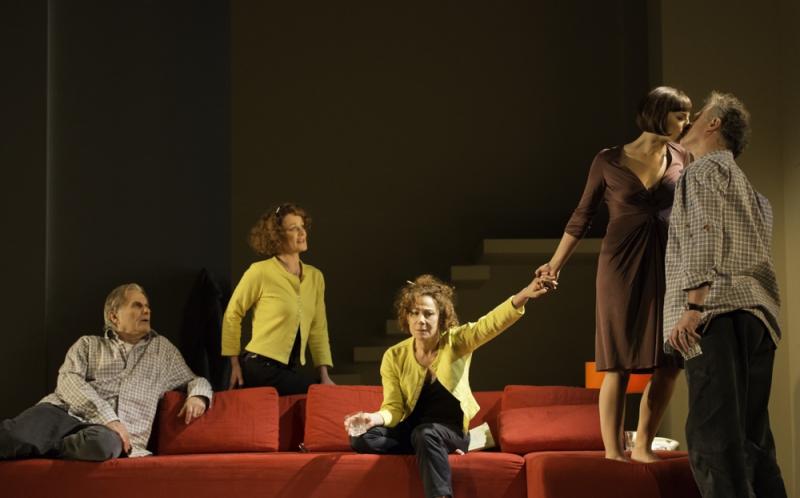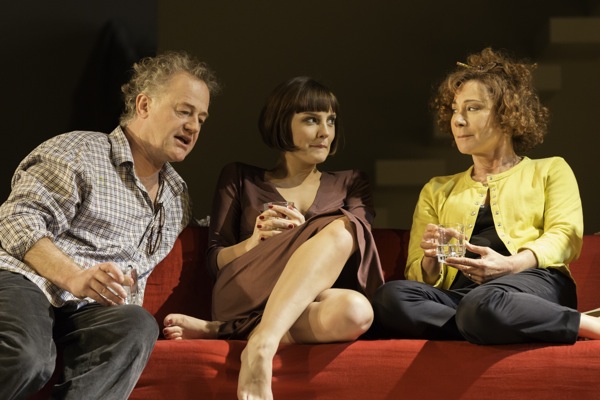Passion Play, Duke of York's Theatre | reviews, news & interviews
Passion Play, Duke of York's Theatre
Passion Play, Duke of York's Theatre
David Leveaux directs Peter Nichols's devastating dissection of sexual betrayal

What’s the price of betrayal? In Peter Nichols’s 1981 play it’s a painful splintering of the psyche. The betrayer mentally compartmentalises in order to be both affectionate husband and ardent lover; the betrayed loses her confidence, her purpose, even her identity until she is – in ways that Nichols makes theatrically explicit – beside herself.
There are moments when this ghastly anti-romantic gavotte creaks faintly, carrying with it the sour whiff of the hangover from the sexual-liberation party games of the Sixties. But the drama, often compared to Stoppard's The Real Thing and Pinter's Betrayal, still steps with cruel wit and cool elegance through the carnage of infidelity, in a production by David Leveaux designed to break your heart, and with central performances to die for.
Hildegard Bechtler’s set is clinical white, aside from a scarlet sofa that punctuates the pallor. This is the smart home of Eleanor (Zoë Wanamaker), a music teacher and amateur chorister, and James (Owen Teale), a picture restorer. Neither has any religious faith, yet while he labours meticulously over paintings of biblical scenes, she finds in the sound of voices singing sacred music the closest thing to “heaven on earth”. And, it seems, they love one another. Wanamaker, all tousled curls and kittenish sensuality, is, James remarks, like a “cat with cream”. He, though he denies he’s a passionate man, is still aroused and absorbed by his wife. But the intervention of Kate (Annabel Scholey), young, attractive and a fashionable photographer with a taste for married men, slices, cold and steely, into the comfortable, accustomed routine of their lives.
Everyone attempts to remain grown-up, civilised. Eleanor is forced to hear of James’s infidelity from a close confidante, Agnes (Sian Thomas), who nurses her own bitter grudge: her ex-husband, now dead, left her for Kate. Eleanor trembles as the killer blow is dealt, in pseudo-sympathetic tones, in a cafe over the teapot. The ensuing confrontation leads to uneasy agreement and a resumption of relations, both within Eleanor and James’s marriage and between Kate and Eleanor, who attempt to pick up the frayed threads of their friendship. But the action slides queasily out of focus as Nell and Jim, the alter egos of Eleanor and James, materialise onstage, and it forcefully emerges that they have both become fractured; one will irrevocably fall apart.
 As is highlighted by Fergus O’Hare’s sound design, the play references the Requiem Mass; even Agnes’s name seems a sly allusion to the Agnus Dei, and as her torment draws on, Eleanor senses an impending Dies Irae – a Day of Wrath. Samantha Bond as Nell and Oliver Cotton as Jim provide caustic commentary. During James’s early entanglements with Kate, Cotton’s Jim interjects with a disapproval that swings between loyalty to Eleanor and a distaste for Kate, with her well-worn and unsubtle seduction techniques – “all the knocking-shop accoutrements” – that verges on the misogynistic. And Bond is both a voice of defiance and a goad for the increasingly desperate Eleanor. Bond and Cotton may each be required to play only fragments of a character, but they have more to work with than Scholey (pictured above with Teale and Wanamaker), glossily glamorous as Kate, who is painted only as a shallow and dislikable manipulator.
As is highlighted by Fergus O’Hare’s sound design, the play references the Requiem Mass; even Agnes’s name seems a sly allusion to the Agnus Dei, and as her torment draws on, Eleanor senses an impending Dies Irae – a Day of Wrath. Samantha Bond as Nell and Oliver Cotton as Jim provide caustic commentary. During James’s early entanglements with Kate, Cotton’s Jim interjects with a disapproval that swings between loyalty to Eleanor and a distaste for Kate, with her well-worn and unsubtle seduction techniques – “all the knocking-shop accoutrements” – that verges on the misogynistic. And Bond is both a voice of defiance and a goad for the increasingly desperate Eleanor. Bond and Cotton may each be required to play only fragments of a character, but they have more to work with than Scholey (pictured above with Teale and Wanamaker), glossily glamorous as Kate, who is painted only as a shallow and dislikable manipulator.
And yet for all the deliberation of the play’s structure, Leveaux’s production zings, stings and draws blood, and Wanamaker is devastating, visibly crumbling as every certainty is stripped away from her. Deft and deadly.
- Pasison Play at the Duke of York's Theatre until 3 August
rating
Share this article
The future of Arts Journalism
You can stop theartsdesk.com closing!
We urgently need financing to survive. Our fundraising drive has thus far raised £49,000 but we need to reach £100,000 or we will be forced to close. Please contribute here: https://gofund.me/c3f6033d
And if you can forward this information to anyone who might assist, we’d be grateful.

Subscribe to theartsdesk.com
Thank you for continuing to read our work on theartsdesk.com. For unlimited access to every article in its entirety, including our archive of more than 15,000 pieces, we're asking for £5 per month or £40 per year. We feel it's a very good deal, and hope you do too.
To take a subscription now simply click here.
And if you're looking for that extra gift for a friend or family member, why not treat them to a theartsdesk.com gift subscription?
more Theatre
 Troilus and Cressida, Globe Theatre review - a 'problem play' with added problems
Raucous and carnivalesque, but also ugly and incomprehensible
Troilus and Cressida, Globe Theatre review - a 'problem play' with added problems
Raucous and carnivalesque, but also ugly and incomprehensible
 Clarkston, Trafalgar Theatre review - two lads on a road to nowhere
Netflix star, Joe Locke, is the selling point of a production that needs one
Clarkston, Trafalgar Theatre review - two lads on a road to nowhere
Netflix star, Joe Locke, is the selling point of a production that needs one
 Ghost Stories, Peacock Theatre review - spirited staging but short on scares
Impressive spectacle saves an ageing show in an unsuitable venue
Ghost Stories, Peacock Theatre review - spirited staging but short on scares
Impressive spectacle saves an ageing show in an unsuitable venue
 Hamlet, National Theatre review - turning tragedy to comedy is no joke
Hiran Abeyeskera’s childlike prince falls flat in a mixed production
Hamlet, National Theatre review - turning tragedy to comedy is no joke
Hiran Abeyeskera’s childlike prince falls flat in a mixed production
 Rohtko, Barbican review - postmodern meditation on fake and authentic art is less than the sum of its parts
Łukasz Twarkowski's production dazzles without illuminating
Rohtko, Barbican review - postmodern meditation on fake and authentic art is less than the sum of its parts
Łukasz Twarkowski's production dazzles without illuminating
 Lee, Park Theatre review - Lee Krasner looks back on her life as an artist
Informative and interesting, the play's format limits its potential
Lee, Park Theatre review - Lee Krasner looks back on her life as an artist
Informative and interesting, the play's format limits its potential
 Measure for Measure, RSC, Stratford review - 'problem play' has no problem with relevance
Shakespeare, in this adaptation, is at his most perceptive
Measure for Measure, RSC, Stratford review - 'problem play' has no problem with relevance
Shakespeare, in this adaptation, is at his most perceptive
 The Importance of Being Earnest, Noël Coward Theatre review - dazzling and delightful queer fest
West End transfer of National Theatre hit stars Stephen Fry and Olly Alexander
The Importance of Being Earnest, Noël Coward Theatre review - dazzling and delightful queer fest
West End transfer of National Theatre hit stars Stephen Fry and Olly Alexander
 Get Down Tonight, Charing Cross Theatre review - glitz and hits from the 70s
If you love the songs of KC and the Sunshine Band, Please Do Go!
Get Down Tonight, Charing Cross Theatre review - glitz and hits from the 70s
If you love the songs of KC and the Sunshine Band, Please Do Go!
 Punch, Apollo Theatre review - powerful play about the strength of redemption
James Graham's play transfixes the audience at every stage
Punch, Apollo Theatre review - powerful play about the strength of redemption
James Graham's play transfixes the audience at every stage
 The Billionaire Inside Your Head, Hampstead Theatre review - a map of a man with OCD
Will Lord's promising debut burdens a fine cast with too much dialogue
The Billionaire Inside Your Head, Hampstead Theatre review - a map of a man with OCD
Will Lord's promising debut burdens a fine cast with too much dialogue

Add comment